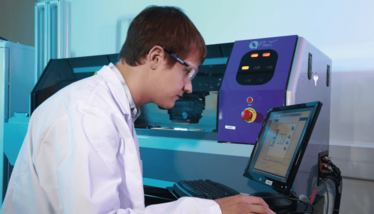
Outsourcing on the Rise
En vogue and in demand, the industry’s reliance on CDMOs is growing

With full pipelines and delivery times stretching well into the distant future, CDMOs are being called upon by pharma companies with increasing frequency to meet process development and manufacturing demands. Denis Geffroy, VP of Business Development, and Professor Tom Moody, VP Technology Development and Commercialisation, both at Almac Sciences, give their perspectives on the issue – and how the CDMO sector is shaping up to handle increased workloads.
What is driving the demand for outsourcing?
Denis Geffroy: There are many drivers of increased demand for outsourcing, but three major factors stand out to me. First, there is the buoyancy of the pharmaceutical industry. In 2018 alone, the FDA approved 59 drugs – a record for the agency. The number and frequency of drugs being approved means that companies are more concerned than ever before about speed to market. Top CDMOs have reacted quickly to this demand by increasing capacities through acquisitions and new builds. But despite the high-level expansion and acquisition in the CDMO sector, it remains highly fragmented.
Second, APIs are becoming more complex, with many going beyond traditional small or large molecules. Drug developers need state-of-the-art capabilities that bridge R&D, process design, analytical, solid state and specialist technology areas to handle certain complex molecules – and sometimes the best way to access these needs is to use a CDMO. As the API moves through the clinical phases, optimum processes are needed to keep cost of goods under control and to shorten timelines for delivery; technologies such as biocatalysis and flow chemistry are important in this endeavour, and are most readily accessed via technology-rich CDMOs.
The third driver for the growth of the CDMO market are environmental and safety pressures. Many Asian-based factories have been forced by governments to shut down multiple manufacturing plants, resulting in a significant impact on many commercial and development supply chains. In many cases, the API, registered starting material (RSM) or intermediate manufacture has returned to Europe and USA for security of supply – and this has added further pressures to manufacturers who are already busy. It should be noted for more complex intermediates and/or RSMs that the actual price differential for supply of these materials between the East and the West can be minimal – sometimes it's even cheaper in the West because of smarter reaction design and the application of technology.
What new technologies are customers most interested in?
Tom Moody: The manufacture of complex APIs, RSM and/or intermediates requires high tech solutions to deliver materials with the agreed quantity and most importantly the desired quality. In addition, many clients are looking for economical, safe, scalable, reliable and high quality supply chains. Technologies such as chemo and biocatalysis and flow chemistry are helping to address most of these. Technology-driven processes have proven to help process scalability and lower cost-of-goods without any negative impact on timelines.
Denis Geffroy: Neoantigen derived vaccines have become a major new strategy within oncology as researchers look to harness the body’s own immune system to fight cancer. The treatment platform is completely individualized. CDMOs wanting to get involved in this area will need to explore their capacity to deliver these personalized therapies to patients and consider how to develop higher capacity and faster GMP manufacturing rates.
How do the attitudes of big pharma differ to SMEs when it comes to outsourcing?
Geffroy: There is still a strong parallel between company size and outsourcing requirements. Big pharma companies are certainly outsourcing more, particularly small molecule API contracts, but they are also streamlining their supply chains, opting for a small number of strategic partners with a broad range of capabilities, rather than a large number of niche suppliers. Smaller companies, particularly small biotechs, are hugely reliant on outsourcing. These companies typically do not have much manufacturing capability and therefore, outsource practically their entire pipeline to CDMOs.
What’s the biggest challenge for CDMOs in 2020?
Geffroy: The political climate will impact how CDMOs progress this year. It is crucial that companies pay attention to what is happening and take any necessary action to safeguard their business and customers. For example, after the Brexit referendum in 2016, Almac Group made a strategic decision to proactively mitigate any potential Brexit impact for our clients by establishing a facility in Europe. Our thinking: whatever happened following the Brexit vote, we would be guaranteed access to the EU post-withdrawal.
Moody: In my view, technology advancements will play a huge role in CDMOs’ futures when it comes to outsourcing decisions. A CDMO must demonstrate that it has the right technologies in place to ensure that each drug developer knows their molecule is not only in safe hands, but will also be developed in the most efficient and cost effective way possible. The latest technologies can go a long way towards improving manufacturing efficiency.
After finishing my degree, I envisioned a career in science communications. However, life took an unexpected turn and I ended up teaching abroad. Though the experience was amazing and I learned a great deal from it, I jumped at the opportunity to work for Texere. I'm excited to see where this new journey takes me!



















